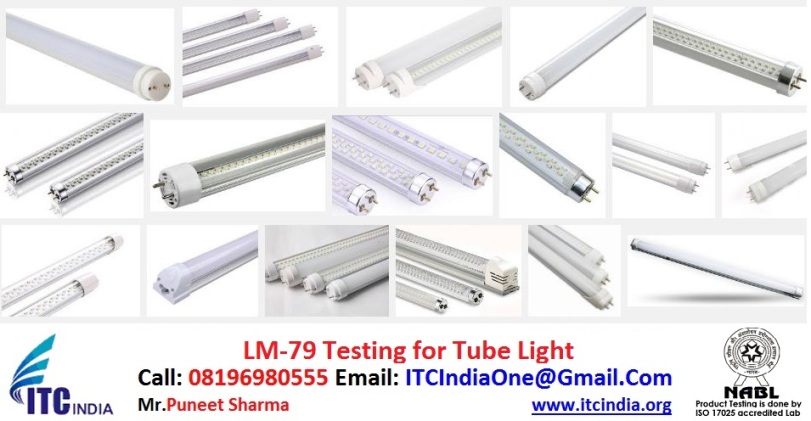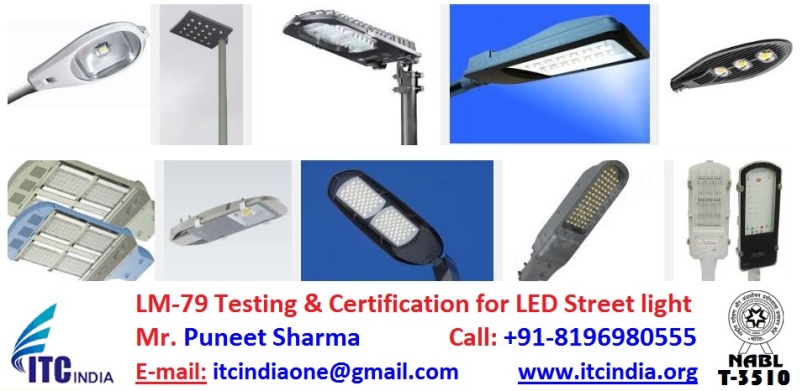LM-79 Testing, Lm 79 Test report, LM 79 Test procedure, India
ITC India is a NABL accredited laboratory in discipline of Electrical (T-1811), Electronics (T-3509) and photometry (T-3510), serving its satisfied customers for last 5 years. Laboratory is fully equipped with the highly accurate Machines to test LM 79. It owns a Integrating sphere as well as the Goniophotometer. Qualified and experienced engineer are appointed to perform the desired tests.
Gone are those days when we use incandescence (tungsten filament) or fluorescent (mercury atoms) bulb. They are replaced by LED’s Now; this is an era of SSL (LED) as ……There is innumerable reason for the rise in LED’s which cannot be counted on finger tips. It is beneficial to both USERS as well as to the nation. Its superior features make it so promising that one cannot deny using LED’s. The features of LED’s are, its low power consumption, digitally controllable, Low maintenance, Ultra long source life, no UV or IR radiations, No mercury content. SSL uses semiconductors material to convert Electricity into light. LED’s are non carbon materials.
Efficacy is the quality parameter for LED: it is measure in Lumen per watt. Higher efficacy means high energy efficient. Another quality factor is lifetime and last but not the least is Color rendering Index (CRI). CRI measures the ability of light source to reproduce the color of various objects in comparison with natural light source.
How LM-79 testing can help assess LED luminaries quality and performance?
AS LM79 report provides you with the Photometric as well as electrical parameters with a spectrum Test report. The photometric parameters are luminous flux, Efficacy and Radiant Power, CIE colorimetric Parameters (coordinates Color rendering Index (CRI), color coordinate Temperature (CCT) Duv Value, and light Intensity Distribution .Current, Voltage, Power factor, Power and frequency are the electrical parameters. It Focus on the efficiency and CRI, which are the quality parameter. Efficiency measures how much electrical energy is converting into light energy. Power factor is another electrical metric for LED driver performance and often a key parameter for street lighting due to the large number of these luminaries connected to the power grid. As far as for lifetime, LM 80 covers that part.
What is the LM-79 test methodology?
LM 79 is approved method to test Photometric and electrical measurements of Solid state lightning. It describes the procedure and precaution to be observed during measurements. This approved method covers LED based SSL products with control electronics and heat sinks incorporated, that is , those devices that require only AC main power or a DC voltage power supply to operate. This document does not covers SSL products that require external operating circuits, or external heat sink. LM 79 covers SSL product in a form of luminaries (fixture incorporating light source) as well as integrated LED lamps.
Why do we need it?
We need it to access the quality and other parameters due to increasing competition in the market. It provides the efficiency and power factor.
How is LM-79 different from other test methods used for conventional lighting products?
This approved method is a guide developed for the measurements of SSL products. While many other standards for photometric measurements of light sources and luminaries are available, these standards are separated for measurements of lamps and luminaries. Since the current SSL products are in the form of luminaries or lamps, and LED light source in luminaries are not easily separated as replaceable lamps, these existing standard cannot be applied directly to SSL products. This necessitates the use of absolute photometry. This test method uses absolute photometry where as other standard uses relative photometry in short.
Now lets us clear about relative and absolute photometry.
| S.NO | Absolute Photometry | Relative Photometry |
| 1 | Total lumen output of a luminary (bulb with fixture) | Total Lumen output of a bare lamp is measured. |
| 2 | Method used to measure LED performance. | Method used to measure Bare bulb and system performance. |
| 3 | Output is relative to an easy measured condition. | Output is measured in calibrated units under specific operating and environment conditions, ambient temperature, input voltage and orientation. |
| 4 | Specific lamp performance does not matter, | Lamps and system performance matters. |
| 5 | Use for SSL products | For NON SSL products |
What are the LM-79 test outcomes?
The outcome of the LM 79 is the REPORT providing all the required parameters as per LM 79.
They are ……
- CIE colorimetric parameters
- Chromaticity coordinate (x)
- Chromaticity coordinate (y)
- Chromaticity coordinate (u’)
- Chromaticity coordinate (v)
- Chromaticity coordinate (v’)
- Correlated color temperature(Tc)
- Duv Value
- Color Rendering Index(Ra)
- Photometric Parameters
- Luminous Flux( Lumen)
- Luminous Efficacy( Lm/W)
- Radiant Power
- Electric Parameters
- Input Voltage(V)
- Current(A)
- Power(W)
- Power Factor
- Frequency(Hz)
- Test information
Ambient Temperature, Stabilization Time, Total Operating Time, Sphere Dia, Photometric method or instrument used Wavelength range in nm of spectroradiometer.
Along with this a SPECTRUM TEST REPORT is also issued.
What are the limitations of LM-79?
- Chips, Packages, or Modules requiring external heat sinks or operating circuits are not covered
- Does not state the sampling size.
Is there a future scope for improvement in the LM-79 test?
Yes of course, there is always a scope for improvement in all areas.
Range/criteria of acceptance of CCT, CRI & Lumens may be defining to establish a harmonization of parameters globally.
Top Searches related to LM 79 Tests for LED Tube Lights:
If you’re Buyers Demanding for LM-79 Testing– Contact Now!
ITC India has around 5000 clients from LED lighting division from All over India.
Get LM 79 Test Report, You can Please feel free to Ask for Quotation.
Mr. Puneet Sharma | Call: 08196980555 | E-mail: ITCIndiaOne@Gmail.Com
Get Instant Quotations, Fill the Enquiry form:
Submit your requirement for Testing:-E-mail:
Describe Your Requirements with Technical Details:




